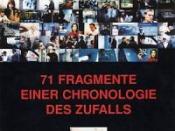Texts reflect the culture and values of their eras by presenting and addressing perspectives of the composers on the issues of the context. The poem The End and the Beginning by Wislawa Szymborska and the Austrian film 71 Fragments of a Chronology of Chance by Michael Haneke accomplish this by exemplifying issues in 1990s society such as the increasing influence of media and the breakdown of interpersonal communication.
The End and the Beginning is a Polish poem by Wislawa Szymborska which captures a warÃÂs aftermath on its innocent citizens and how, in time, both the war and its origins are forgotten. It thus shows how the values of a country or society may change over time as the views and opinions of its citizens change.
The overall tone of the poem is grim and bitter, with both clear references and poetical allusions to death throughout. The poem can be rendered into two parts ÃÂ the first focusing on rebuilding and the second focusing on the fading of memories with the passing of time.
In the first part, the third and fourth stanzas highlight the citizensÃÂ perspectives, accomplished through references to rebuilding on a much smaller scale, ÃÂSomeone must glaze a window, rehang a doorÃÂ. Szymborska addresses the fact that we are shown the impact of war on a much larger scale and highlights the importance of such small, almost mundane tasks that are required in the process of rebuilding a country. In turn, this can be seen as a microcosm for the larger effects of war on a country, such as the nationÃÂs economic stability and global connections ÃÂ both of which became increasingly important in the 1990s, with issues such as globalisation and consumerism having profound impacts on the world.
Szymborska also addresses the issue of the increasing impact...


